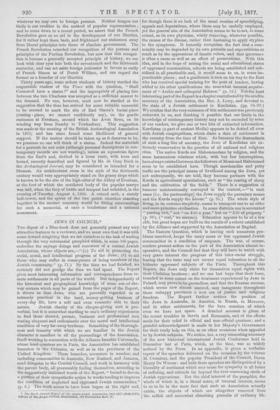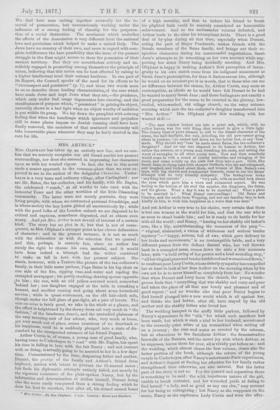JEWS IN COUNCIL.*
THE digest of a Blue-book does not generally present any very attractive features to a reviewer, and we must own that it was with some inward misgiving that we set ourselves to the task of wading through the very substantial pamphlet which, in some 160 pages, embodies the sayings doings and resources of a central Jewish Association, whose objects are,—" (a) To aid in promoting the social, moral, and intellectual progress of the Jews ; (b) to aid those who may suffer in consequence of being members of the Jewish community." (p. 71.) By the time we had finished, we certainly did not grudge the time we had spent. The Report gives most interesting information and correspondence from re- mote settlements in all parts of the world. But independently of the historical and geographical knowledge of some out-of-the- way corners which may be gained from the pages of the Report, it shows us that Jews, who are generally regarded as ao intensely practical in the bard, money-getting business of every-day life, have a soft and oven romantic side to their nature. Jewish charity of the cheque-giving sort is pro- verbial, but it is klomewhat startling to one's ordinary experiences to find these shrewd, prosaic, business and professional men waxing eloquent and enthusiastic over the moral and intellectual condition of very far-away brethren. Something of the thorough- ness and tenacity with which we are familiar in the Jewish character is manifest in all the proceedings of the Association. Itself working in connection with the Alliance Israelite Universelle, whose head-quarters are in Paris, the Association has established branches in the Colonies, as well as in the provinces of the United Kingdom. These branches, seventeen in number, and including communities in Australia, Now Zealand, and Jamaica, send delegates to the Central Council, and work in harmony with the parent body, all presumably feeling themselves, according to the suggestively italicised words of the Report, "bound to devote a portion of their sympathetic action to works tending to improve the condition of neglected and oppressed Jewish communities." (p. 6.) The work seems to have been begun at the right end,
* 2'he Sixth Annual Report of the Anglo-Jewish Association, 1876-1877 (06854087). Offloos of theAnglo-Jowish Aaaociation,160 Portadown Bow,
for though there is no lack of the usual routine of speechifying, appeals and deputations, where these may be usefully employed, yet the general aim of the Association seems to be to act, to some extent, as its own physician, wisely removing, wherever possible, the causes of the disease, rather than hastening to apply styptics to the symptoms. It honestly recognises the fact that a com- munity may be degraded by its own pursuits and superstitions as much as by the oppressions of fanatic rulers, and that ignorance is often a cause as well as an effect of persecutions. -With this idea, and in the hope of raising the social and educational status of oppressed communities, schools are being established and sub- sidised in all practicable and, it would seem to us, in some im- practicable places ; and a gentleman is now on his way to the East who has received special training for the post of teacher, having added to his other qualifications the somewhat unusual acquire- ment of "Arabic and colloquial Hebrew." (p. 12.) Not the least interesting part of the Report is a chapter contributed by the erudite secretary of the Association, the Rev. A. L6wy, and devoted to the state of a Jewish settlement in Kurdistan. (pp. 91-99.) We confess that the very existence of this settlement was previously unknown to us, and thinking it possible that our limits in the knowledge of contemporary history may not be exceeded by some of our readers, we give one or two bits of extracted information. Kurdistan (a part of ancient Media) appears to be dotted all over with Jewish congregations, which claim a date of settlement in the country from the time of Ezra. As becomes the descendants of such a long line of ancestry, the Jews of Kurdistan are ex- tremely conservative in the practice of all national and religious rites. The native Kurds are Mahommedans by religion, and the same harmonious relations which, with but few interruptions, have always existed between the followers of Moses and Mahommed seem to be established here. Though merchandise and petty traffic are the principal means of livelihood among the Jews, yet not unfrequently, we are told, they become partners with the Kurds in agricultural speculations, such as "the rearing of sheep and the cultivation of the fields." There is a suggestion of humour unintentionally conveyed in the context,—" in such cases [i.e., the partnerships] the Jews supply the pecuniary means and the Kurds supply the labour." (p. 95.) The whole style of living, in its extreme simplicity, seems to transport one to an older and more primitive civilisation. In some districts one is accounted "passing rich," not "on 140 a year," but on "£10 of property" (p. 96), (" real," we assume). Education appears to be at a low ebb, but great hopes are built on the results of a schonl established by the Alliance and supported by the Association at Bagdad.
The Eastern Question, which is leaving such numerous pro- blems unsolved, keeps the many more or less oppressed Jewish communities in a condition of suspense. The war, of course, renders present action on the part of the Association ahnost in- operative, and the Council feel that they will have to watch with very grave interest the progress of this inter-racial struggle, fearing that the issue may not secure equal toleration to all the hitherto oppressed subjects of the Porte, Throughout this Report, the Jews only claim for themselves equal rights with their Christian brethren ; and we can but hope that their fears, founded to some extent on the treatment experienced by Jews in Poland, may prove to be groundless, and that the Russian success, which seems now almost assured, may inaugurate throughout these unhappy provinces a new era of justice and religious freedom. The Report further notices the position of the Jews in Australia, in America, in Russia, in Morocco, and in other settlements, for the bare mention of which even we have not space. A detailed account is given of the recent troubles in Servia and Roumania, and of the efforts made for their relief in official and non-official quarters ; and a grateful acknowledgment is made to her Majesty's Government for their ready help on this, as on other occasions when appealed to by Jewish subjects. We notice, too, a very interesting summary of the now historical international Jewish Conference held in December last at Paris, which, at the time, was so widely noticed by the Press. In an appendix, is given a verbatim report of the speeches delivered on the occasion by the veteran M. Cremieux, and the popular President of the Council, Baron Henry De Worms ; and both these speeches are distinguished by a liberality of sentiment which sees cause for sympathy in all forms of suffering, and extends far beyond the ever-narrowing circle of Jewish oppressions. But the chief interest of the pamphlet, the whole of which is, in a literal sense, of unusual interest, seems to us to lie in the more fact that such an Association actually exists, the objects of which are altogether removed from the selfish and somewhat absorbing pursuits of ordinary life.
We find here men uniting together avowedly for the re- moval of persecution, but unconsciously working under the influence of a strong feeling of clanship for the perpetua- tion of a racial distinction. The sentiment which underlies the efforts of the Association is very different from the national love and patriotism which helped to make a united Italy. The Jews have no country of their own, and seem to regard with com- plete indifference the bare possibility that the issue of the present struggle in the East might secure to them the possession of their ancient territory. But they are nevertheless actively and un- selfishly engaged in promoting among themselves the principle of union, believing that this union can be best effected by raising to a higher intellectual level their outcast brethren. In one part of its Report, the Council speaks of the need for its efforts to be "circumspect and persistent" (p. 7), and these two words seem to us to describe those leading characteristics„of the race which have made Jews and kept Jews what they are,—the prudence, which only under bad usage degenerates into cunning, and the steadfastness of purpose which, " persistent" in gainingits object, naturally shows in a bad light when no object worthy of ambition is put within its grasp. We lay down the pamphlet with a strong feeling that when the handicaps which ignorance and prejudice still in some places impose on Jewish running shall have been finally removed, the members of that scattered community will take honourable place wherever they may be fairly started in the race for life.































 Previous page
Previous page